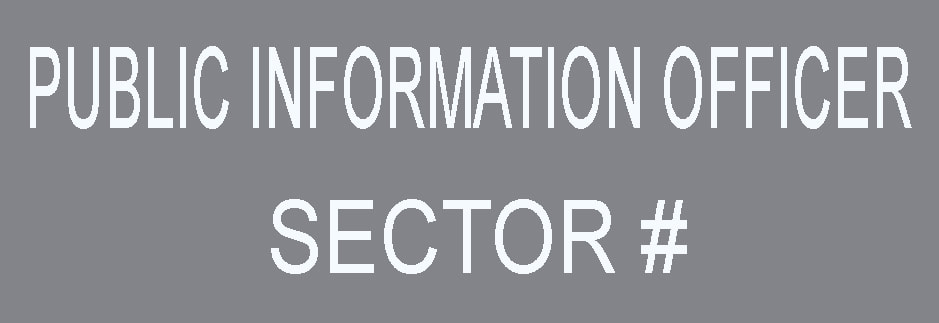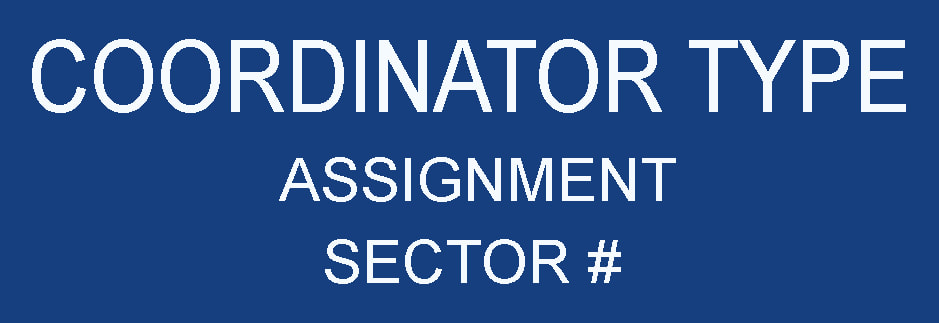-
General HQ:
Junction City, Oregon -
Call Us:
541-321-0804 -
Email Us:
[email protected]
The Sector Commander is the only mandatory staff for a Sector Headquarters and is typically appointed by Central Command. Depending on the size of the headquarters the Commander may do all the other staff roles, or be assisted only by one or two other staff. Staff may have more expanded roles than are listed here, and the powers of many roles may be combined into only one or two staff positions. Multiple versions of each staff role may be assigned when needed (sometimes in the form of Deputies or Assistants, which is designated on the badge), however only one Commander and Vice Commander may exist per area of responsibility. Which staff roles, what specific powers they have, and how many roles are assigned depends on the needs and size of the area of responsibility. Staff roles may typically exercise their authority across all commands and units within their jurisdiction.
Headquarters staff roles are considered in addition to regularly assigned unit responsibilities and duties, unless specifically included in those duties. Facility Commandants also have the ability to appoint Headquarters Staff in the same way Sector Commanders do. When appointed, Facility Headquarters Staff use the same roles and descriptions as Sector Headquarters Staff, but their badges display the facility name or number rather than the Sector and number. All Staff are designated by colored role badges worn below the number tape.
Headquarters staff roles are considered in addition to regularly assigned unit responsibilities and duties, unless specifically included in those duties. Facility Commandants also have the ability to appoint Headquarters Staff in the same way Sector Commanders do. When appointed, Facility Headquarters Staff use the same roles and descriptions as Sector Headquarters Staff, but their badges display the facility name or number rather than the Sector and number. All Staff are designated by colored role badges worn below the number tape.
Sector Commander
|
Duties: In charge of all units, facilities, and personnel within their designated area of responsibility. Additional Sector Level Responsibilities: Running and organizing Sector Meetings, Bible Studies (can be delegated to Chaplain if one is assigned), Training, Sector Projects and Events, and overall managing of the Sector itself. They are also tasked with creating schedules for meetings and events, and making sure to adhere to the schedule. Additionally they manage finances, discipline and personnel issues within their area of responsibility, and the swearing in of new members. Can do all of, or a combination of, the other Area Staff roles.
Requirements: Must be a Commissioned Officer Details: Not an elected position, appointed directly by the Board or Central Command. Serves until they step down or are removed. Is the only necessarily filled Area Command Staff position. |
Vice Sector Commander
|
Duties: Can take over the duties of the Sector Commander in their absence. Assists the Sector Commander in their duties. Can take over duties of other Staff in their absence.
Requirements: Must be an NCO or higher. Details: Not typically an elected position. Typically the second highest ranking person in an area of responsibility, or a specifically designated position. Can be an elected or rotating position at the discretion of the Area Commander and those involved, if multiple people of the same rank qualify for the position. If a Vice Sector Commander is not specifically designated, the role falls by default to the next highest ranking person in the area. |
Emergency Manager
|
Duties: Manages emergency response and preparedness functions within a Sector, including Emergency Response resources, units, personnel, and overall capability.
Requirements: The Sector Commander is by default the Emergency Manager for the Sector if dedicated personnel are not assigned, however these duties can be delegated (Typically to a ranking member of Central Command, IMOS, Emergency Response, or other designated person). Must be an NCO or higher. Must meet training and/or certification requirements. Details: Appointed by the Sector Commander via delegation of authority |
Public Information Officer
|
Duties: Manages public information, including social media messages, press releases, and any interactions with the media.
Requirements: The Sector Commander is by default the Public Information Officer for the geographical area if dedicated personnel are not assigned, however these duties can be delegated (Typically to a ranking member of Central Command, Public Affairs, or other designated person). Must be an NCO or higher. Must meet training and/or certification requirements. Details: Appointed by the Sector Commander via delegation of authority. |
Secretary
|
Duties: Manage and maintain sign in sheets, records, and related log information and documents. Is in charge of making sure sign in sheets are completed correctly, and managing the sign-in sheet and issuance of points if present. Must log information after each event as required. Is in charge of handing out and processing paperwork. Takes and manages minutes and notes as assigned. Supports administrative functions and carries out other duties as assigned.
Details: Can be appointed by the Sector Commander, elected, or re-elected each year. Typically is an elected position at the Sector level. |
Quartermaster
|
Duties: Manages facilities and access for meetings and events. Turns on lights, unlocks doors, and does setup before each event. Turns off lights, locks doors, and cleans up after each event. Additionally, if no Quartermaster personnel are assigned to the area, issues equipment out to personnel and manages equipment logistics. If no VFAC personnel are assigned to the area, the Quartermaster also manages facilities maintenance and operations. Must arrive 15 minutes early to meetings and events that require facility access. Quartermaster Roles can be further subdivided into specific types and responsibilities when needed.
Requirements: Can be any rank level. Details: Can be appointed by the Sector Commander, elected, or re-elected each year. Typically is an elected position at the Sector level. |
Coordinators
|
Duties: Coordinators act as representatives and/or senior leadership for programs operating in an area, or oversee specific mission aspects or tasks. Outreach Coordinators / Community Outreach Coordinators act as ambassadors and liaisons that interface between the community and the Central Aid Agency to engage the community in ways related to the C.A.A. mission. Outreach Coordinators may be created for specific disciplines / focuses, or may cover multiple disciplines / focuses depending on the needs and personnel of the jurisdiction creating them. Program Coordinators are responsible for overseeing the operations of a program within the jurisdictional area.
Requirements: Can be any rank level Details: Appointed by the Sector Commander, program or C.A.A. policy, or via voluntary participation. |
Chaplain
|
Duties: Provides counseling, faith support, and spiritual guidance to those that seek it. May oversee Bible studies and other faith activities (if delegated by the Area Commander). Perform Christian ceremonies as requested.
Requirements: Can be any rank level, but is typically a Commissioned Officer. Details: Appointed by the Area Commander, program or assignment, or via voluntary participation. |
Prayer Leader
|
Duties: Leads the group in group prayers. Prays before meals. Can be delegated to lead Bible studies. Assists Chaplains if assigned and trained to do so.
Requirements: Can be any rank level. Details: Can be appointed by the Sector Commander, elected, or re-elected each year. Typically is an elected position at the Sector level. Can be a long-term position or temporary. |
Color Guard
|
Duties: Hangs and folds up flags, manages general care of flags, and is in charge of flag ceremonies and duties.
Requirements: Can be any rank level. Details: Can be appointed by the Sector Commander, elected, or re-elected each year. Typically is an elected position at the Sector level. Role requires at least two personnel. |
Mission / Incident / Operations Commander
|
Duties: Functions as senior operational leadership authority, or performs the duties of a specific leadership role, for a set time period or assignment. Mission Commanders typically oversee unit missions or are part of an area command structure. Incident Commanders typically oversee incident operations and function at a tactical level. Operations Commanders typically oversee operations that may encompass multiple individual incidents, and function at a more strategic level. All commander roles may be filled by qualified personnel of any rank level and used as a tool for leadership development and training. This badge type is also used to designate ICS staff roles.
Requirements: Can be any rank level. Details: Appointed by the Area Commander, election, formal process, or voluntary participation in leadership development. Duties last only for a set time period or assignment. |











